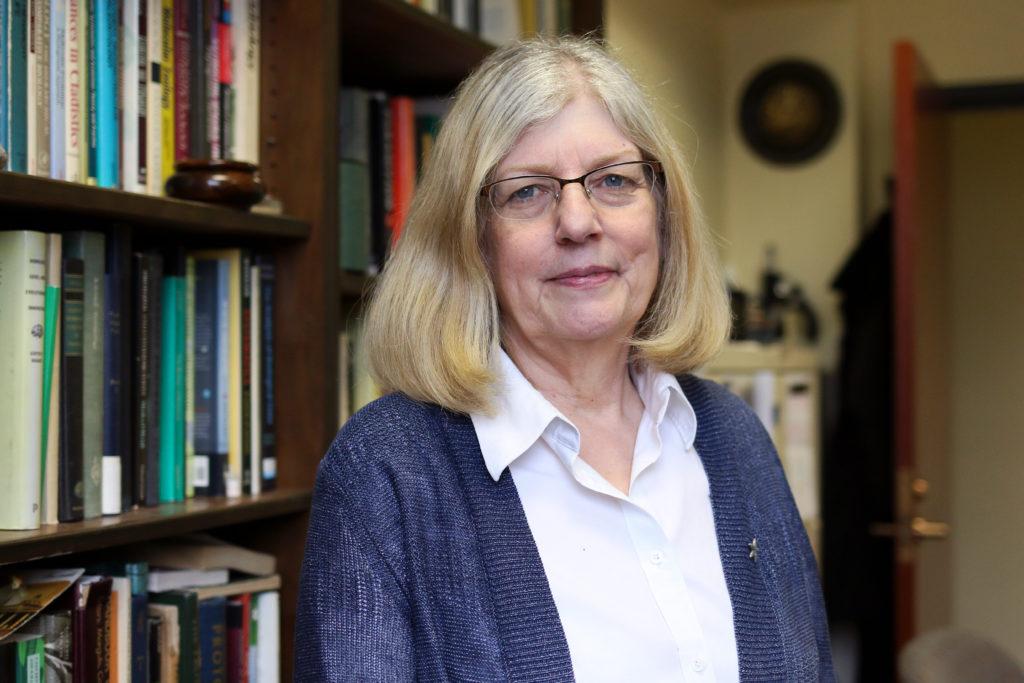Updated: April 9, 2019 at 11:01 a.m.
Ever since Diana Lipscomb got her hands on a microscope in second grade, she has been intrigued by insects and “little organisms” like bacteria.
Years later, in the mid-1970s, she studied biology at Agnes Scott College, a women’s liberal arts school in Georgia, where she said a professor suggested that she become a biologist. In 1982, she became a doctor of zoology after graduating from the University of Maryland at College Park and landed a job as a biology professor at GW – and she’s been teaching ever since.
Now, after her nearly four-decade tenure in the biology department, Lipscomb said she plans to retire at the end of the semester.
“Like with most academics, you go where there is a good job, and I was very lucky to get this job,” she said.
Lipscomb expanded the department’s evolutionary biology curriculum, added an evolutionary medicine course, served as the chair of both the biology and statistics departments and even briefly stepped in as the interim dean of the Columbian College of Arts and Sciences during her tenure.
“I’m proud of the way GW has grown and changed while I’ve been here,” she said.
Lipscomb said she worked with Robert Weintraub, a former professor of biology, to hire faculty for the Weintraub Program in Systematics and Evolution, which she created for graduate students in 1994. She said the Weintraub Program is an opportunity for some graduate students to receive funding to study interactions between organisms with the program’s faculty.
Lipscomb, who also worked for the National Science Foundation as a program officer from 2002 to 2003, said the Weintraub Program’s creation garnered recognition from the academic community, elevating GW as a major center for biological diversity research.
“GW, in the late 1990s and the early 2000s, was going through a huge transformation in becoming a more research-active university,” Lipscomb said. “We went from one where people did some research to one where we were really pushing it hard.”
Lipscomb said she served as the associate dean of faculty and research for CCAS in 2004 after being asked by then-Dean William Frawley. Two years later, when Frawley stepped down, she filled the role of interim dean for 17 months.
“That was fun because when you’re dean, you’re helping students and faculty achieve the academic goals that they have,” she said.
Lipscomb chaired the biology department from 2008 to 2014. She said one of her biggest accomplishments while serving as chair was hiring seven new professors to replace retiring faculty.
In addition to teaching a course on evolutionary medicine, which she developed six years ago, Lipscomb also currently teaches a class on invertebrate zoology and a graduate class on evolution.
But Lipscomb said she also encountered challenges during her tenure, like finding up-to-date facilities for teaching and research. She said the department now operates in Bell and the Science and Engineering halls which gives faculty more space, but “planning and managing the split of the department into two buildings without fracturing the department was challenging.”
Lipscomb said that after retiring, she plans to move to Colorado with her husband to live closer to their daughter and her family. She said that although she has enjoyed living in a city, she looks forward to residing “in a place where getting into nature doesn’t involve a traffic jam.”
Colleagues said they admire Lipscomb’s work to build the biology department’s reputation as a “leading” research center and her efforts to form personal relationships with each of her students.
Paul Wahlbeck, the interim dean of CCAS, said she has helped shape the school’s vision, supported faculty and mentored students throughout her career.
“She’s advanced the college and the Department of Biology through her leadership and her dedication in the lab and the classroom,” Wahlbeck said in an email. “I know everyone at Columbian College is grateful for her contributions and her friendship.”
Gustavo Hormiga, a professor of biology, said Lipscomb sits down with each student individually during their lab periods and shows them how to study specimens during her invertebrate zoology class.
“She does things that you would rarely see other professors do in terms of commitment,” Hormiga said. “She’s a tough example to follow.”
Hormiga – who met Lipscomb in 1993 at a scientific conference in Copenhagen, Denmark, when he was still a graduate student – said her efforts to hire four faculty to build the Weintraub Program helped increase the program’s reach and offer students more mentors to help with research projects.
“Diana always had a very clear vision of what she wanted to do for the department and the University,” he said. “We really owe a lot to her from literally any academic point of view you can think of.”



